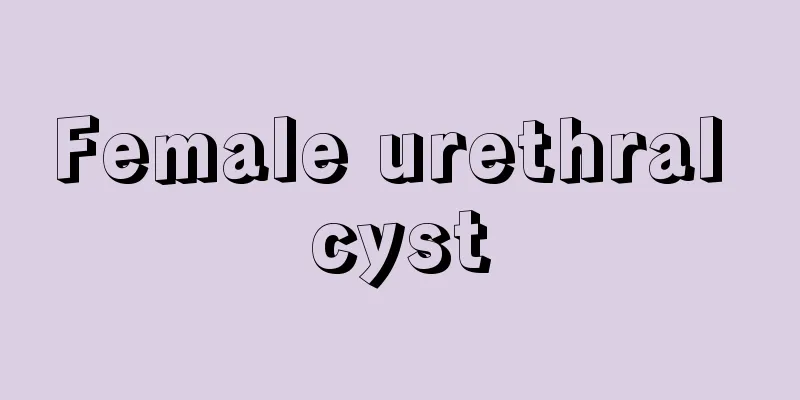Female urethral cyst

|
Some women may find that their urethral opening has such a phenomenon. This may be because women pay enough attention to their private hygiene, resulting in bacteria infecting the urethra and causing urethritis, which can have a very big impact on women. If left untreated for a long time, it can lead to more serious illness. Next, let’s find out what to do if a female has an external urethral cyst. 1. What is a paraurethral gland cyst? The paraurethral glands are distributed on both sides of the posterior wall of the female urethral opening. Once infected, they often become hidden foci of recurrent urinary tract infections. If the gland's outlet is blocked, a paraurethral gland cyst or abscess may form. 2. Causes There are two openings of paraurethral glands near the external urethral opening on the posterior wall of the urethra, which is a place where gonococci can easily lurk. Once infection occurs, the urethral opening will become congested, red and swollen. If the inflammation is not actively controlled, it may lead to cysts. Treatment If the cyst is not serious and not large, check it regularly. Eat a healthy diet, maintain hygiene, keep the area clean, supplement vitamins, and use potassium permanganate for cleaning. Cystectomy is the treatment of choice for paraurethral cysts. If the cyst is large, located deep, or has heavy adhesions to surrounding tissues, in order not to damage the urethra, only part of the anterior wall of the cyst may be removed, i.e., a cyst fenestration operation may be performed. 4. Paraurethral cyst resection 1. Indications Paraurethral cysts have obvious clinical symptoms. 2. Contraindications 3. Inflammation of the vulva or vagina due to various reasons; during acute or chronic urinary tract infection; during menstruation. 3. Postoperative complications Bleeding, infection, urethral stenosis, urinary retention 4. Anesthesia method and preoperative preparation Anesthesia method: local anesthesia. Preoperative preparation: Potassium permanganate solution sitz bath twice a day for 3 days before surgery. Patients with cystitis or gonococcal urethritis should wait until they are cured before undergoing surgery. 5. Surgical Procedures A metal urinary catheter is placed. Incise the mucosa. The cyst was excised free from the base. The cyst cavity was closed with interrupted sutures and the mucosa was sutured. 6. Postoperative Care Keep the vulva clean. You can use a cotton ball to clean the vulva the next day. Give antibiotics to prevent infection. Remove the catheter 2 to 5 days after the operation. 7. Postoperative precautions Avoid squeezing and rubbing the affected area and pay attention to hygiene. Avoid sexual intercourse within 1 month after surgery. It is recommended to pay attention to rest and local hygiene. After the operation, you can fully recover in 2 weeks. You must pay attention to hygiene to avoid reinfection, and wash and change your underwear frequently. 8. Postoperative diet After the operation, the diet should be light, avoid spicy and irritating foods, and make sure to drink plenty of water. |
<<: What to do if a pregnant woman cannot urinate
>>: Will I urinate more during early pregnancy?
Recommend
How to abort a 3 month pregnancy
The third month of pregnancy is usually about 12 ...
A 95-year-old man had an urgent fracture surgery, and letting the anesthetic float up solved the anesthesia problem
On Monday morning, just after the morning meeting...
Pubic pain means I'm about to give birth
Because everyone's physical fitness is differ...
How to prevent tick bites? What are the symptoms of tick bites?
What exactly are ticks? What harm do ticks do to ...
What to do with your girlfriend on New Year's Eve 2020 Sweet words to say to your girlfriend on New Year's Eve
Unconsciously, 2019 is coming to an end and 2020 ...
Food Safety | Emergency Measures after Food Poisoning
Students should not panic if they have food poiso...
How many times a month do women ovulate?
Many women who want to get pregnant and have thei...
Don't delay if you have these 3 symptoms of hepatitis B
1. Abnormal liver function: If a hepatitis B pati...
AllThingsD: In Q2 2012, Pinterest's social recommendation traffic increased by 2535% compared with the same period last year
According to an AllThingsD analysis report, Pinte...
Caesarean section lochia precautions
A woman will go through the process of pregnancy ...
Are your teeth sensitive after teeth cleaning? A periodontist will tell you →
As a periodontal specialist, I often encounter pa...
"Deadly serial calls" can't wake you up in the morning! How many alarm clocks are best for waking up in the morning?
There are many ways to wake up in the morning. Wh...
Treatment of pelvic effusion and pelvic inflammatory disease
I believe everyone knows the importance of the pe...
How many months can a pregnant woman have sex?
After giving birth, the mother's physical con...
The endometrium is a little thin
A thin endometrium in women can easily cause cert...









